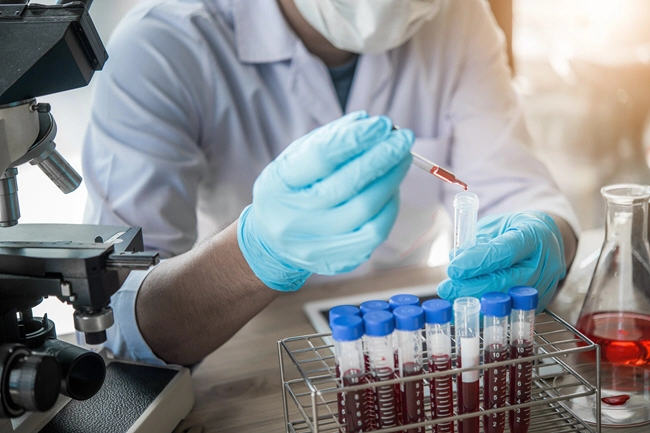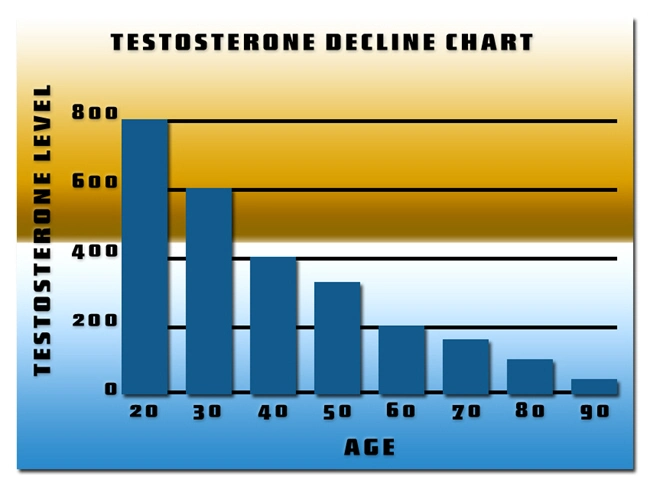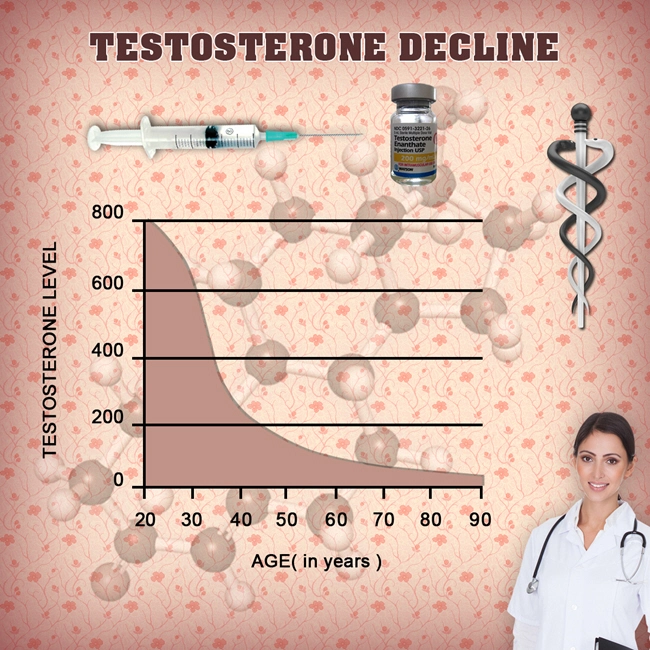

As we age our levels of Human Growth Hormone (HGH) begin to ebb away. When we hit age 30 our growth hormone begins a slow descent at approximately 10% per decade. This is a crucial and often overlooked development since adequate growth hormone helps to keep the body functioning at optimal levels, including the vital thyroid gland.
Let's take a detailed dive into the role of this tiny powerhouse and see why it is so critical to our continued well-being.
Football is a team sport, and all of the players must perform at their peaks for the team to succeed, regardless of their positions.
But there are two indisputable facts about the importance of those roles.
First, the highly skilled players on the offense (quarterbacks, running backs, and pass receivers) get the most publicity and are considered the “glory players,” since they put points on the board.
Video Link: https://vimeo.com/286249734
Video Download: Click Here To Download Video
Video Stream: Click Here To Stream Video
But many experienced football coaches and fans know that the game is decided “in the trenches,” by the performance of both the offensive and defensive linemen.
Without the blocking and tackling that goes on, mostly unnoticed, every single time the ball is snapped, there could be no exciting, spectacular plays.
This leads to two other conclusions:
- When the linemen block efficiently, opening up huge holes for the running backs, and protecting the quarterback, their team usually wins. Yet the linemen remain anonymous.
- When the linemen are mentioned on the news, all-too-often it is a result of a penalty they committed at a crucial time. In other words, they aren't appreciated when they do their job. When they don't, they catch hell, since so many things go wrong.
This Also Applies to the Thyroid Gland
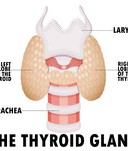
Think about it. How many of us even know how important the thyroid gland is, or how much work it does?
Perhaps it's time to take a detailed look at this remarkable subclinical to appreciate all of the essential functions it performs, every minute of our existence.
The thyroid gland is shaped like a butterfly, and resides in the throat, slightly below the Adam's Apple.
The thyroid is classified as an endocrine hormone, which means it produces hormones.
In this case, the thyroid pumps out the hormones that regulate our metabolism.
The definition of metabolism is: “The chemical and physical processes that occur within the body to maintain life.”
The thyroid controls this by controlling the efficiency and speed at which our cells operate.
The thyroid is, without a doubt, one of our most essential glands, some would argue that it is THE MOST important since thyroid hormones regulate many of the other hormonal glands.
If the thyroid hormones are not secreted in precise amounts, our cells slow down in performing their life-preserving roles of synthesizing the proteins needed for cellular growth and removing waste.
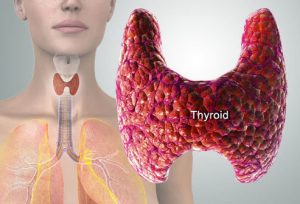
The thyroid gland is responsible for:
- Ensuring that our cells remain healthy, and use energy efficiently
- Regulating our metabolism by controlling our body fat levels and our bone density
- Assisting our nervous system
- Helping our cognitive ability by enhancing brain functions
- When we're young, it supports the production and release of Growth Hormone and allows us to grow
- Regulating our body temperature
When the thyroid is malfunctioning, a condition called hypothyroidism results, with several adverse, potentially dangerous side effects. Here are a few of them:
- Fatigue
- Dry Skin
- Premature aging
- Infertility
- Constipation
- Depression
- Osteoporosis
- Muscle weakness
- Weight-gain
- Decreased appetite
- Diabetes
- Cancer
- Cognitive impairment
- Hair loss
- Intolerance to heat and cold
- And more, much, much more. This parade of horrors just keeps on coming.
One of the hormones produced by the thyroid gland is called Thyroid Stimulating Hormone (TSH), also referred to as thyrotropin.
Its purpose is to manufacture the thyroid gland's production of thyroxine (T4), which is crucial to regulating our energy metabolism.
T4 is the primary hormone produced by the thyroid gland. Its function is to navigate through the blood to particular targeted cells, then convert to triiodothyronine (T3).

T4 is not as active as T3.
A good analogy is this: T4 delivers the instructions from the thyroid, then T3 gets to work to carry out the mission.
In its free form, “free T3” is the more active form of thyroid hormones.
If your levels of T3 are scraping bottom, that's exactly how you'll feel.
Many feel that free T3 should be the “gold standard" of thyroid function since it plays the end role in boosting your metabolism.
When testing for thyroid functioning, physicians start with TSH.
If the TSH number is high, it is an indication that the thyroid gland is working harder than usual, to maintain the correct level of thyroid hormone.
In the worst-case scenario, this could be a precursor to a heart attack or other types of coronary artery problems called sub-clinical hypothyroidism (SCH).
Thyroid hormones work in a circular, feedback method.
The hypothalamus gland manufactures thyroid-releasing hormone (TRH), and the pituitary gland produces TSH.
When the “engine" is humming a long and fine-tuned, your levels of the hormone rise to what is needed, then the production stops.
T3 and T4 are in perfect balance.
T3 and T4 are the two vital hormones that regulate all of the cells in the body. But their precise, fragile balance can be upset. Here are a few things that can cause an imbalance between these hormones:
- Nutrition. As with so many health problems, much of the trouble begins with what you eat. Luckily, in spite of the mountains of different ill-advised nutritional guidelines endlessly touted by Internet “foodies” and government agencies, common-sense rules. Bad fats, bad carbs, junk food, fast food, processed food, artificial sweeteners and anything loaded with preservatives and chemicals must be kept to a minimum – or better still, avoid them altogether. Eat smart, and be strict about the junk. Soy and gluten can also cause problems for some people. Finally, make sure to get a sufficient amount of iodine in your diet. Without it, your thyroid will not have enough of the raw materials necessary to produce the thyroid hormones you need.
- Stress. A certain amount of stress is inevitable and can be beneficial. But excessive, chronic stress is devastating to your body in many ways, including your thyroid. Exercise, meditation, sports, and hobbies are common stress-busters. But whatever works for you is excellent. Don't ignore stress. Be aware of when it is getting out of control, and deal with it.
- Too much exercise. Working out and staying active is a great stress-buster, as was mentioned above. But over-training can present problems. Over-training can cause hormone depletion, overstress and damage your bones, weaken your immune system, flood your body with cortisol (“the stress hormone”), slow your healing processes down to a crawl, and leave you feeling “burnt out.” If you are new to exercise, start slow and listen to your body. Don't be afraid to get sufficient rest, and at times take a break if your body is sending signals that scream “slow down.”
- Toxins in the environment. This is especially problematic for many of these chemicals that are capable of wreaking havoc on your thyroid are disguised in everyday items found in your kitchen and bathroom. Chlorine, fluoride, and bromine are antagonistic to your iodine receptors and are located just about anywhere and everywhere: flours, bakery items, plastic, hot tub treatments, the water that flows from your kitchen faucet, and much more seemingly harmless objects. The key is to educate yourself on the ingredients in what you have in your house, and when possible replace them with products that contain safer components.
To better understand the importance of the thyroid, consider the lint trap in your dryer.
Without a lint trap, massive amounts of lint would accumulate in the dryer vent hose, with several adverse consequences: lowering the dryer's efficiency, which shortens its lifespan and bumps up the risk of fire.
The thyroid gland also mimics the air filter in your furnace.
When it's clogged, it impedes the flow of warm air.
As a result, the furnace will be forced to work longer and harder to keep the temperature where you want it.
This can increase your gas bill, as well as eventually wear out your furnace.
Earlier, the term subclinical hypothyroidism was mentioned.
This refers to the gray area where the TSH is elevated, and the thyroid is operating slower than it should, yet not so low as to cause the patient to be diagnosed with hypothyroidism.
There may be a few symptoms of the condition, but they are very subtle.
To make matters worse, many of the symptoms of hypothyroidism are the same symptoms that result from natural aging.
This is why they are often overlooked.
The definition of SCH is “a condition where TSH levels are elevated, but thyroxine levels fall within the normal range.”
This condition has been linked to coronary artery disease (CAD), which dramatically increases the risk of heart attack, blockage of the arteries and chest pain (angina).
There are two common treatment approaches.
Many people have benefited from beginning their treatment with a natural thyroid product like Armour Desiccated Thyroid.
There is also a newer pharmaceutical prescription known as Synthroid.
Do not hesitate to study the advantages and side effects of both approaches, and discuss this with your endocrinologist.
Treatment is tricky since a fine line must be followed.
Over-treatment can cause more harm than benefits with many possible side effects: a bone weakness that could lead to the dreaded osteoporosis, muscle weakness, abnormal heartbeat, nausea, and this – “other unusual medical events.”
This last quote came directly from the Synthroid web page.
On the other hand, under-treatment could allow several problems that are under the surface to grow into serious issues, since you will not have enough medication to deal with your hypothyroidism.
What You Can Do to Keep Your Thyroid Functioning at its Best

To sum up, after reading the above information, hopefully, you're convinced that the thyroid deserves the best treatment you can give it.
Here are some ideas to keep in mind. Some of them have already been mentioned, but a good review will tie things together:
- Eat smart. Hi-octane nutrition (fresh vegetables and fruits, lean protein, healthy fats, “good” carbs, and adequate hydration) is a great place to start. Also, don't forget that what you don't eat is as important as what you do eat. As mentioned earlier soy products like tofu, soy milk, and soybeans can inhibit the effectiveness of hypothyroid medications and should be minimized or avoided.
- Get off the couch with the right physical fitness routine. Not too little, and not too much. Strive for a balance between strength, cardiovascular endurance training, flexibility, and balance. All are important.
- Control stress. There are many ways of doing this. What's the best way for you? The way that you enjoy, and will continue to follow. Please don't neglect this.
- Avoid environmental toxins. Read labels and research. This also includes medications as well.
- Get medical help. If you have any of the symptoms of hypothyroidism mentioned above, contact your physician and get your thyroid tested. If needed, consider medication, and discuss this in detail with your healthcare provider.
- Consider supplementation. An excellent combination of nutrients that can assist the thyroid is iodine (from kelp and potassium iodate), vitamins A and B-12, magnesium (as magnesium carbonate), ashwagandha extract, L-tyrosine, Korean ginseng, and Guggul (gum resin). These substances are best found in an all-in-one formula.
Finally, here is a quiz you can take to give you some idea of how your thyroid is functioning.
- Are you unusually sensitive to temperature extremes?
- Do your hands and feet often get cold?
- Do you ever wake up and see a puffy face in the mirror?
- Are you having more and more trouble keeping the pounds off?
- Does almost everything you eat turn to fat?
- Is your skin overly dry?
- Do you hit the snooze button in the morning when you don’t feel like getting up?
- Do you suffer from constipation?
- Are you stiff in the morning?
- Are you often tired?
- Do you “hit the wall” in the afternoon?
- Are you becoming increasingly more forgetful?
- Do you often experience brain fog?
- Are you noticing your hair is thinning?
- Are you feeling apathetic and have you lost interest in the things that you used to enjoy?
A score of 0-3: Your thyroid is probably functioning fine.
A score of 4-6: You probably need to ask your doctor to check your thyroid.
A score of more than 6: You need to discuss this with your doctor. This score indicates a high possibility of thyroid problems.
When you begin a hormone replacement therapy regime at our clinic, we will maintain constant surveillance of all of your essential glands, including the thyroid.
Remember, the thyroid gland is your “offensive line” for your path to good health. Set the right environment for it to do its job.
And restoring your growth hormone to a more youthful, stable, and balanced range will work wonders in keeping your thyroid in tip-top shape. Contact us for a FREE, no-obligation discussion of the miraculous benefits of growth hormone!
Reference
How does the thyroid gland work?
Background: Function of the thyroid gland
Contact Us Today For A Free Consultation
Dear Patient,
Once you have completing the above contact form, for security purposes and confirmation, please confirm your information by calling us.
Please call now: 1-800-380-5339.
Welcoming You To Our Clinic, Professor Tom Henderson.

- How to Get Started with HGH Injections [Last Updated On: December 2nd, 2020] [Originally Added On: August 24th, 2020]
- At Last! Introducing Humatrope HGH Replacement Therapy [Last Updated On: February 1st, 2025] [Originally Added On: August 29th, 2020]
- Omnitrope...a Powerful Addition to Your Anti-Aging Toolbox [Last Updated On: January 31st, 2025] [Originally Added On: September 2nd, 2020]
- Nutropin Makes Old Bodies Young Again! [Last Updated On: January 31st, 2025] [Originally Added On: September 3rd, 2020]
- Buy Serostim HGH Injections: Can Serostim injectable human growth hormone help one to increase lean muscle mass through body building? [Last Updated On: January 30th, 2025] [Originally Added On: September 8th, 2020]
- Like To Join The Anti-Aging Party? You Can…With Saizen [Last Updated On: January 28th, 2025] [Originally Added On: September 9th, 2020]
- Causes of Human Growth Hormone (Somatropin) Deficiency [Last Updated On: January 30th, 2025] [Originally Added On: September 17th, 2020]
- Ipamorelin: A new tool to boost your growth hormone levels [Last Updated On: October 10th, 2024] [Originally Added On: March 16th, 2021]
- What You Need to Know About Somatropin (Humatrope) [Last Updated On: January 29th, 2025] [Originally Added On: April 1st, 2021]
- Considering Growth Hormone Replacement Therapy for Injury Relief? [Last Updated On: January 29th, 2025] [Originally Added On: August 16th, 2021]
- HGH Purchased From Mexico Is Illegal - Don't Buy HGH Illegally [Last Updated On: March 1st, 2025] [Originally Added On: September 2nd, 2021]
- The Incredible Benefits of Growth Hormone [Last Updated On: January 28th, 2025] [Originally Added On: September 14th, 2021]
- Buy Human Growth Hormone Legally! [Last Updated On: January 26th, 2025] [Originally Added On: September 26th, 2021]
- Side Effects and Dangers of Growth Hormone [Last Updated On: March 4th, 2025] [Originally Added On: September 26th, 2021]
- Boost Growth Hormone [Last Updated On: January 19th, 2025] [Originally Added On: September 26th, 2021]
- Growth Hormone: Hollywood's Secret of Youth [Last Updated On: January 26th, 2025] [Originally Added On: September 26th, 2021]
- Glossary of terminology [Last Updated On: July 8th, 2024] [Originally Added On: September 26th, 2021]
- Growth Hormone Side Effects [Last Updated On: January 18th, 2025] [Originally Added On: October 6th, 2021]
- Buy Growth Hormone: Legally [Last Updated On: March 2nd, 2025] [Originally Added On: October 7th, 2021]
- How to Dispose of Needles Correctly [Last Updated On: January 23rd, 2025] [Originally Added On: October 7th, 2021]
- How To Avoid Growth Hormone Scams [Last Updated On: January 22nd, 2025] [Originally Added On: October 7th, 2021]
- How to Inject Growth Hormone [Last Updated On: January 23rd, 2025] [Originally Added On: October 7th, 2021]
- Growth Hormone Testimonials [Last Updated On: January 25th, 2025] [Originally Added On: October 7th, 2021]
- Growth Hormone and Statin Drugs [Last Updated On: January 20th, 2025] [Originally Added On: October 7th, 2021]
- Doctors Comment on Growth Hormone [Last Updated On: January 24th, 2025] [Originally Added On: October 7th, 2021]
- Growth Hormone Therapy Protocol [Last Updated On: January 22nd, 2025] [Originally Added On: October 7th, 2021]
- All About Growth Hormone [Last Updated On: January 21st, 2025] [Originally Added On: October 7th, 2021]
- Guide to Growth Hormone Replacement Therapy: Somatropin [Last Updated On: January 25th, 2025] [Originally Added On: October 25th, 2021]
- Weekly HGH Injections with Sogroya for Hypopituitarism [Last Updated On: June 20th, 2024] [Originally Added On: June 27th, 2022]
- From Incel to Chick Magnet in One Easy Step [Last Updated On: September 1st, 2024] [Originally Added On: July 8th, 2022]
- Slow Aging with Growth Hormone [Last Updated On: June 18th, 2024] [Originally Added On: July 17th, 2022]
- How to Self-Administer HGH [Last Updated On: June 25th, 2024] [Originally Added On: January 25th, 2023]
- Women in High Stress Situations: Can HGH Help? [Last Updated On: August 21st, 2024] [Originally Added On: March 8th, 2023]
- A Positive Testimonial to HGH Prescription for Growth Hormone Deficiency [Last Updated On: October 24th, 2024] [Originally Added On: September 28th, 2023]
- The Dangers and Illegality of Purchasing HGH from Mexico [Last Updated On: February 25th, 2025] [Originally Added On: February 25th, 2025]
- Legality of Purchasing Human Growth Hormone [Last Updated On: February 26th, 2025] [Originally Added On: February 26th, 2025]
- Implications and Risks of Human Growth Hormone Usage [Last Updated On: February 27th, 2025] [Originally Added On: February 27th, 2025]
